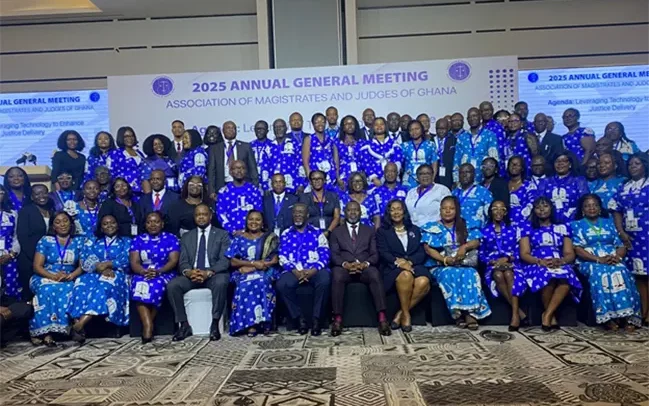Some of the judges at the meeting
Acting Chief Justice, Paul Baffoe-Bonnie, has urged judges in Ghana to approach cases involving illegal mining, known in local parlance as galamsey and drug trafficking with a sense of urgency, as a way of combating the growing menace.
According to him, the devastation caused to the environment and the nation are huge and the Judiciary must play its role in eradicating the canker.
“As members of the Judiciary, we are not policy makers and we do not wield the enforcement powers of the executive. Yet our constitutional role is neither passive nor peripheral. We are the guardians of justice, custodians of the law, and interpreters of the nation’s conscience,” Justice Baffoe-Bonnie said.
He was speaking at the 44th Annual Meeting of the Association of Magistrates and Judges Association of Ghana yesterday. It was under the theme “Leveraging Technology to Enhance Justice Delivery”.
The Acting Chief Justice indicated that the Judiciary’s responsibilities in confronting the challenges of illegal mining and drug trafficking include upholding the law, nothing that “we must ensure that prosecutions related to illegal mining and drug trafficking and abuse are handled with seriousness, impartiality, and urgency. And I mean urgency.”
He said where there is evidence, the law must be applied without fear or favour, emphasising that “no person, and I mean no person, regardless of their political affiliation or social status, should be immune from justice.”
Justice Baffoe-Bonnie also highlighted what he described as “a growing public perception” that sentences for environmental crimes and drug offences are either too lenient or inconsistently applied.
“We must work towards harmonising sentencing practices to ensure propriety, deterrence, and fairness. We must fiercely guard our independence from external pressures, be they political, commercial, or social,” he added.
President of the AMJG, Justice Henry Anthony Kwofie, highlighted some of the challenges facing the Judiciary, particularly infrastructural facilities and welfare packages for judges and magistrates.
He pointed out that even when the Judiciary’s budgetary allocation has been approved and allocations made, getting it released then becomes the problem.
“It suffices to say that facilities for the performance of functions of the Judiciary are released, given to us as if we don’t deserve it,” he said.
He also stated that compensation packages for judges, including allowances, medical bills, and others are not paid on time, a situation which is affecting judges and magistrates who do not have any other source of income.
He called on the Ministry of Finance to at least expedite action on the financial packages for the Judiciary to address the challenges.
Attorney General and Minister of Justice, Dr. Dominic Ayine, assured the gathering that he will to work “assiduously” with his deputy to ensure that the challenges confronting the Judiciary are a thing of the past.
He urged judges and magistrates to bear the solemn duty of ensuring that technology supports rather than supplants judicial reasoning.
“To this end, it is imperative to establish a clear regulatory framework to guide the responsible use of Artificial Intelligence (AI) in our courts, one that safeguards accuracy, integrity, and public trust in the administration of justice,” he suggested.
BY Gibril Abdul Razak


